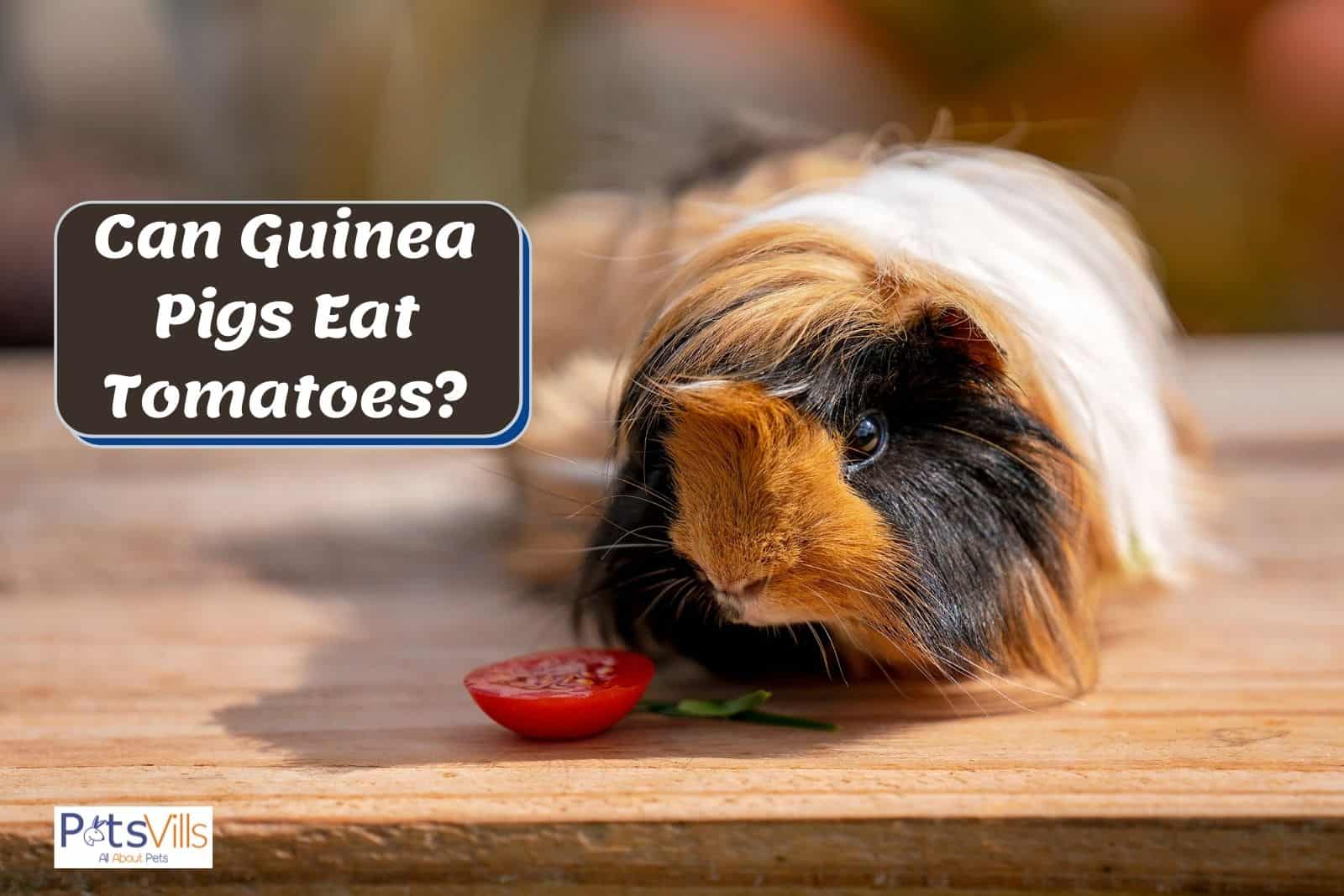Can guinea pigs eat tomatoes?
Tomatoes are a great source of nutrition and vitamins for humans, but is the same true for our cavys?
Short answer, yes…but as always, there are certain things to consider first.
Keep reading to learn more!
Table of Contents
Can Guinea Pigs Have Tomatoes?
In short, yes! Guinea pigs do eat tomatoes and you can feed tomatoes to them.
They make a great occasional treat, containing plenty of vitamin C to keep your fluffy friend in good health.
In addition, tomatoes have relatively low sugar content compared to many other fresh fruits which aid in preventing blood sugar spikes in their little bodies and is better for their dental health.
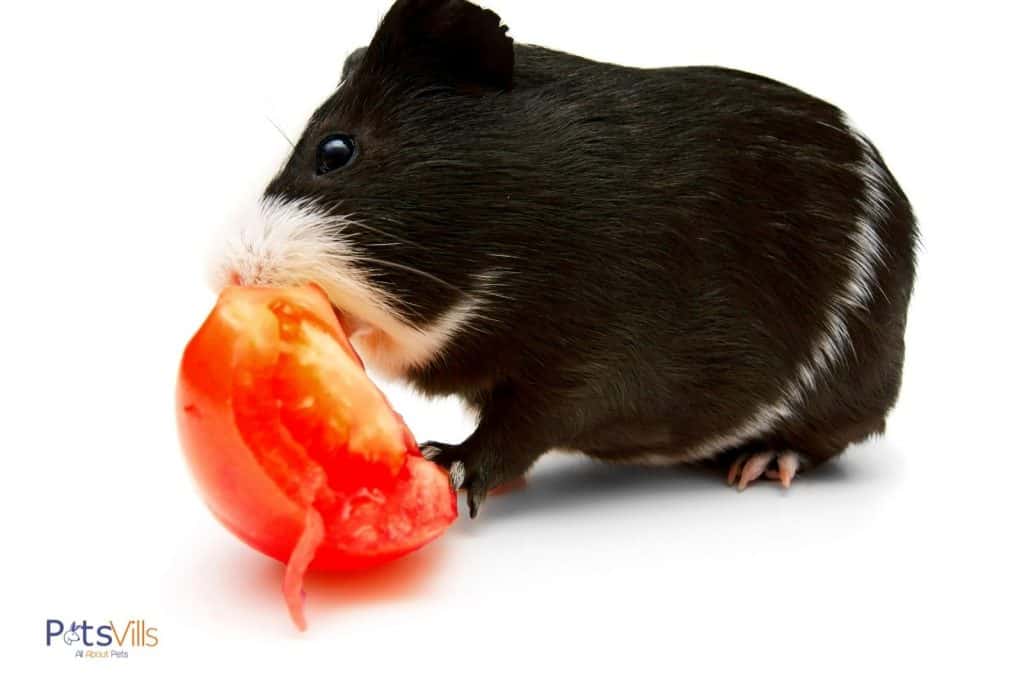
However, you should not feed your little fuzzball any other part of the tomato plant other than the ripe tomato.
Although their leaves may resemble edible leafy greens, they can be toxic to your guinea pig. This is because tomato plants are part of the nightshade family and can be poisonous for guinea pigs.
Any part of the plant, including the leaves or unripe green tomatoes can present severe risks to your pet’s digestive health.
In addition, it would be best if you always were vigilant of any symptoms of allergic reactions in your pets. It may be rare, but some guinea pigs have adverse reactions to various fruits and vegetables.
It is one of the reasons you would avoid introducing any tomato sauce or ketchup to your guinea pig’s diet.
So always try feeding a small piece of tomato first and monitor your guinea pig for 24 hours before feeding anymore.
As far as safe food for guinea pigs go, tomatoes have a few more benefits making them an ideal addition to your piggy’s diet as an occasional treat. Let’s check them out.
Reasons Why Tomatoes Are Good For Guinea Pigs
We mentioned that tomatoes are great as an occasional treat rather than a staple food fed daily. It is the best way to incorporate them into your guinea pig’s diet for several reasons.
1. Great Source of Vitamin C
Like many mammals, the guinea pig can’t produce its own vitamin C.
Many natural and acidic treats outclass any pelleted food when it comes to providing your piggy with the all-important vitamin C they need to stay happy and healthy because the vitamin is heat sensitive and loses its integrity quickly when exposed to the elements.
We all know that vitamin C is crucial to our health, but we don’t always know why. Vitamin C is essential for heart health. Guinea pigs are more prone to heart conditions than many other small pets.
Therefore adequate vitamin C intake is essential for them to live a long and happy life.
Vitamin C supports the immune system, which is important for all living creatures.
However, Guinea pigs raised in captivity may already be at a disadvantage in immune health, and ensuring they get enough vitamin C is important for an immune booster.
Vitamin C also helps your guinea pig absorb another important nutrient: iron.
Guinea pigs eat spinach and other veggies that provide them ample natural iron, but without adequate vitamin C, they will not absorb all the iron they need.
That can lead to anemia. It is mostly the case that the smaller the animal, the more exponential the severity of anemia.
Anemia leads to several physical and neurological issues, including lethargy, decreased motor function, and a lack of appetite.
Vitamin C also acts as an antioxidant. It helps fight cancer and aids in the repair of various cells and soft tissue throughout the body.
This process is important for a healthy body and will aid your piggy in recovering from minor injuries.
Symptoms of vitamin C deficiency include mouth sores, bleeding gums, lethargy, and joint pains.
2. A Source of Potassium
Furthermore, tomatoes are a great source of potassium. Like vitamin C, potassium is an essential nutrient. Potassium is a mineral and a type of electrolyte.
Electrolytes help your guinea pig’s nervous system, and potassium is essential for healthy communication between the nerves and muscles.
It is a function that extends to heart health. Your guinea pig requires enough potassium to keep their heartbeat regular. Therefore, potassium is critical for good heart health.
In addition to its function in the nervous system, this mineral also helps move nutrients into and remove waste from cells.
Potassium helps combat the effects of sodium on an animal’s blood pressure and regulates blood sugar.
3. Rich in Lycopene
Tomatoes are also rich in Lycopene, an antioxidant that helps combat the cell damage associated with free radicals.
So, in conjunction with the antioxidative properties of vitamin C, tomatoes are a formidable source of cancer-preventing antioxidants.
Free radicals are responsible for more than just cancer. There is also a correlation between free radicals and diabetes and heart disease.
You may be surprised to learn that most creatures, your piggy included, produce these compounds in relatively huge quantities.
That is because they also serve several very important functions. For example, immune cells use them to combat infections.
They also play a key role in natural cell death, which is important to all living things despite the phrase.
The problem comes in when an animal hosts too many of these free radicals. They can wreak havoc on the body, which is exacerbated in smaller animals like guinea pigs.
In addition, an imbalance between antioxidants and oxidative free radicals leads to a condition called oxidative stress.
Oxidative stress is far more serious than what many people may believe. In this state, free radicals can damage DNA, leading to several incredibly dangerous conditions.
That is in part why oxidative stress to cancer.
The only way to combat oxidative stress is to make sure that your piggy has enough of the kinds of antioxidants found in tomatoes.
4. A Source of Calcium
Your average cherry tomato contains nearly twice the minimum daily calcium your piggy needs.
We know that calcium is important for healthy bones, but it serves a few more important functions in your fuzzball’s body.
Like potassium, calcium is a mineral that is critical for a healthy nervous system.
It helps ensure that nerve signals travel correctly throughout an animal’s body. It then aids in muscle movement and plays a role in nerve signaling in various tissues.
Furthermore, calcium is important for signaling the release of most hormones and facilitating certain hormonal interactions.
When we consider all this, it becomes clear why this common mineral is critical to your guinea pig’s wellbeing.
5. A Source of Vitamin K
Vitamin K is one of the less-studied essential nutrients that our cavies need. It is essential for blood to clot.
We tend to think of that as a bad thing, but your guinea could potentially bleed out from a small cut if they were vitamin K deficient.
Vitamin K is also critical for wounds to heal properly. There is also some evidence to suggest that it plays a role in skeletal health in mammals.
6. Full of Folate
Folate, or folic acid as it is commonly known, is one of the most important nutrients in any animal’s diet. Folic acid is a key ingredient in the production of red blood cells.
It supports cell health and function. Folate is incredibly important for your guinea pig during pregnancy. It helps in the in-utero development of brain tissue and the natural development of spinal tissue.
7. A good source of hydration
Last, but not least, tomatoes are around 95% water, which is an excellent way for fuzzballs to stay hydrated. However, this is also another reason to feed tomatoes in moderation, because food that is very high in water content can cause diarrhea.
Tomatoes are also high in fiber but can’t satisfy all of a guinea pig’s fiber requirements. So while worth mentioning as a side benefit, it’s not really one of the primary reasons to feed your cavy this fruit.
While a guinea pig will almost certainly jump at the opportunity to snack on a tomato, its digestive system requires more natural fibers.
However, on the whole, tomatoes offer far more benefits for guinea pigs than negatives. The key takeaway is to make sure they only supplement a diet of more fibrous foods.
Fortunately, guinea pigs eat swiss chard and several other high-fiber natural produce with equal enthusiasm.
So, those looking to fill their piggy’s food bowl exclusively with organic foods can implement various safe food options to make up the perfect natural die.
Check out these cute guinea pigs eating tomatoes:
READ MORE: Can Guinea Pigs Eat Banana?
Can Guinea Pigs Eat Cherry Tomatoes?
Cherry tomatoes are safe for your guinea pig to eat. This variant was the first tomato species to be domesticated.
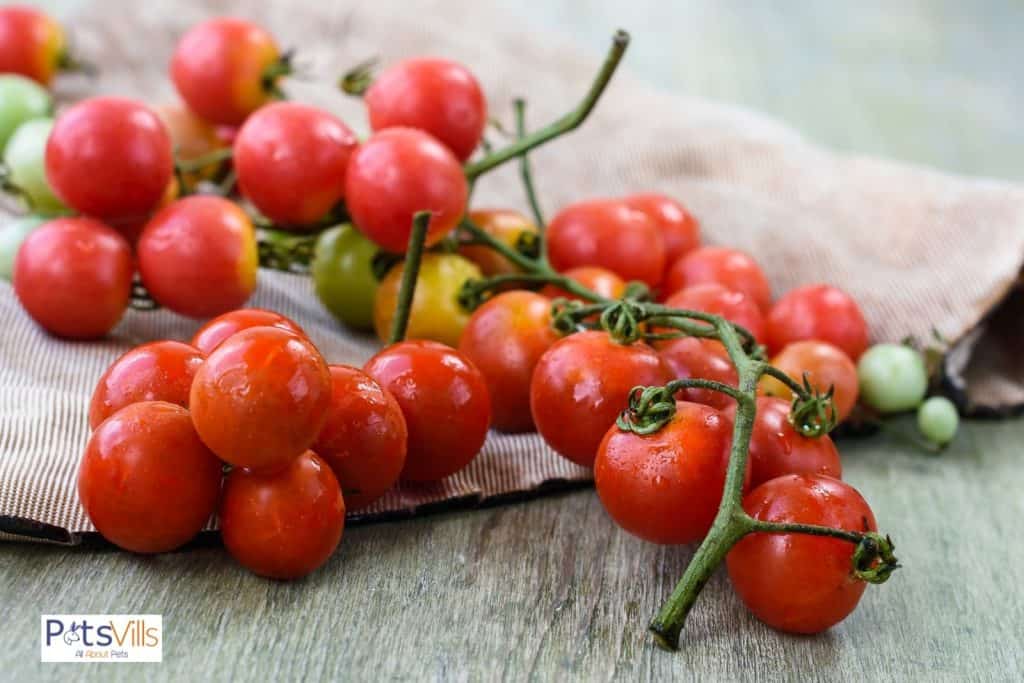
Cherry tomatoes are a sweeter, richer tasting variant of the more common tomato. They come in two types; heirloom and hybrid cherry tomatoes.
Your guinea pig should be happy with either. There are some nutritional differences between the two main variants, but nothing sets either apart as a significant risk. Most people favor the ‘heirloom’ variety.
Expert opinions vary on just how many cherry tomatoes your guinea pig can have. To be on the safe side, you can give your guinea pig two to three cherry tomatoes per week.
Different types of tomatoes do have varying nutritional content levels. However, because they are generally an excellent source of vitamins and nutrients, tomatoes can pose a risk of health issues.
If your guinea pig eats spinach, nuts, carrots, and other vitamin-rich foods, you should be all the more careful of the dreaded ‘vitamin overdose,’ especially if you are adding a vitamin supplement.
In addition, because cherry tomatoes generally contain higher concentrations of certain compounds such as vitamin A, they pose a greater risk than larger tomatoes.
Tomatoes, like oranges and strawberries, are a great source of vitamin C. The tastier cherry tomato has a higher concentration of vitamin C than most larger tomatoes.
Like other tomatoes, Cherry Tomatoes contain citric acid, which is acidic. Too much acidity can cause digestive upset.
When served as a part of your Guinea Pig’s daily diet, too many cherry tomatoes could lead to a wide array of digestive issues like intestinal discomfort.
Intestinal discomfort manifests as abdominal discomfort, which can lead to more serious health issues down the line.
The key takeaway is that cherry tomatoes make for an acceptable treat for your guinea pig, offering many health benefits. Only serve it from two or three a week.
READ MORE: Can Guinea Pigs Have Celery?
Potential Risks of Feeding Guinea Pigs Tomatoes
Even with all of the benefits, there are some risks to feeding guinea pigs tomatoes.
1. Parasites
This is one of the biggest concerns with feeding your guinea pig any fresh produce. The risk is sometimes greater in organic foods and pesticide-free produce. Always check tomatoes thoroughly for any signs of parasites before treating your little furry friend.
2. Pesticides
Pesticides pose a greater health risk to our piggies than they do to us. Because they are so tiny, their little bodies have a much lower tolerance for most toxins. Even a small dose of pesticides could prove fatal.
Organic foods still use pesticides, albeit in smaller quantities. Even a naturally derived pesticide is still poisonous. No matter where you source your tomatoes, always give them a thorough washing under running water.
3. Incorrect Calcium-to-phosphorus Ratio
Unfortunately, although tomatoes are high in calcium, they are much higher in phosphorus. In fact, they have a calcium-to-phosphorus ratio of 0.4:1.
This means that one should always be careful about feeding too many tomatoes and they should only be fed with other high calcium food.
Too much phosphorus binds with calcium and prevents its absorption into the bloodstream, leading to a calcium deficiency, or hypercalcemia. It can also lead to kidney stones and renal issues.
4. Oxalic Acid
Tomatoes are moderately high oxalates. So while they can be fed in moderation, the oxalate levels in their other green food need to be monitored.
Like phosphorus, oxalic acid binds with calcium and can cause a calcium deficiency or kidney stones, or a condition known as cheilitis.
5. Nutrient Related Toxicity
Nutrients like vitamins and minerals are essential to all living things, in some form. Unfortunately, they can also be toxic if ingested in exceedingly high doses.
Even though these doses are sometimes quite high, keep in mind that guinea pigs are pretty small.
So if you are providing your guinea pig with a vitamin supplement, be careful that the amount of beta-carotene and vitamin A already in their fruit and vegetables don’t lead to vitamin A toxicosis or another kind of vitamin toxicity.
Their bodies have a much lower toxicity threshold than larger animals. Consult a vet about your pet’s diet plan to ensure that they don’t face the risk of nutrient-related toxicity.
READ MORE:
Can Guinea Pigs Have Eggplant?
FAQs
How many tomatoes can a guinea pig eat?

Because of the acidity, the oxalates, and the high phosphorus content, it’s best to keep tomatoes to a weekly treat. Your guinea pig can eat between a slice and a quarter of medium-sized tomato once a week, or between one and three cherry tomatoes once per week. Be sure to wash them properly, remove the seeds and slice them into bite-sized pieces.
Can tomatoes kill guinea pigs?
Too much tomato can kill a guinea pig. If the tomato is fed as a staple food every day, it may interfere with calcium absorption, cause kidney stones, and create digestive upset due to the citric acid. Furthermore, if tomatoes are fed while still green, or if owners feed them other parts of the tomato plant, such as the vine, stem, or leaves, the guinea pig may be poisoned by the solanine in the plant.
Is tomato safe for guinea pigs?
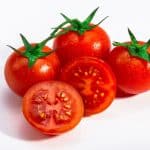
Red, ripe tomatoes are generally considered an occasional safe treat for guinea pigs. They are a safe part of a balanced diet is relatively small quantities. They should not be a staple food, but your guinea pig will enjoy a slice of tomato as a topper on their daily salad about once a week.
Can baby guinea pigs eat tomatoes?
No. Only adult guinea pigs can safely eat and digest tomatoes and most other fresh vegetables and fruit.
Conclusion
Tomatoes are a fantastic source of many vital nutrients. From vitamin C to folic acid, they can provide your guinea pig with a number of their daily nutritional requirements. Tomatoes make for a healthy treat in a nutritionally balanced diet.
References
- Bjornebo, Heather. 2016. “VITAMIN c RECOMMENDATIONS for GUINEA PIGS | Arizona Exotics | -Guinea Pigs Resources.” Azeah.com. August 14, 2016. https://azeah.com/guinea-pigs/vitamin-c-recommendations-guinea-pigs#:~:text=VITAMIN%20C%20RECOMMENDATIONS%20FOR%20GUINEA%20PIGS%20%20,%200.8%20grams%20%203%20more%20rows%20.
- “Guinea Lynx :: Nutrition Charts.” 2021. Guinealynx.info. 2021. https://www.guinealynx.info/chart_CaP.html.
- “All about Guinea Pig Bladder Stones.” The Spruce Pets. 2020. https://www.thesprucepets.com/guinea-pig-bladder-stones-1238880.
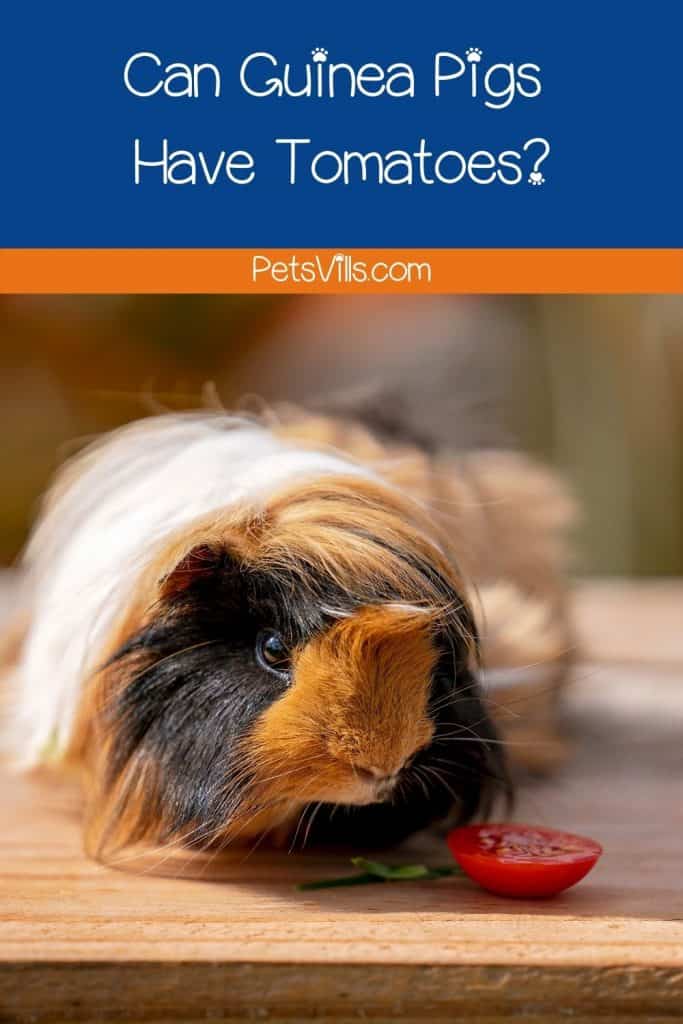
Can guinea pigs eat tomatoes? What are your thoughts on this topic? Please share below!

